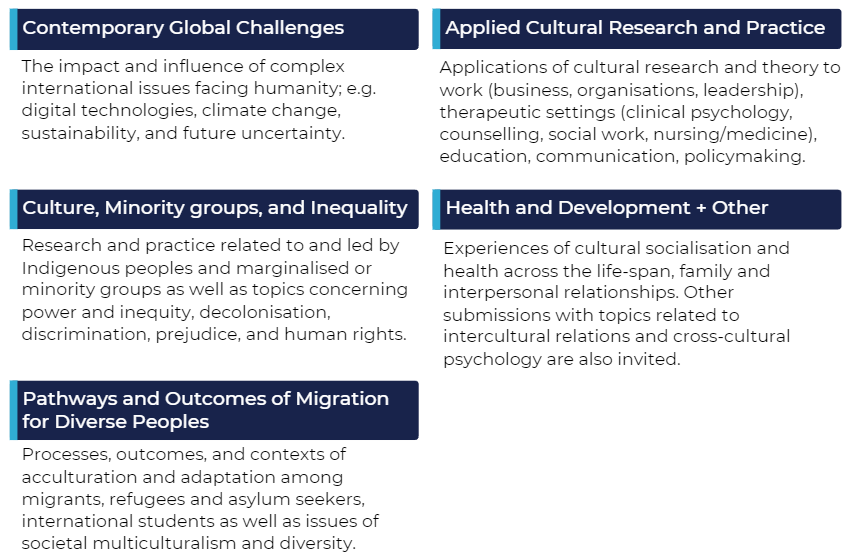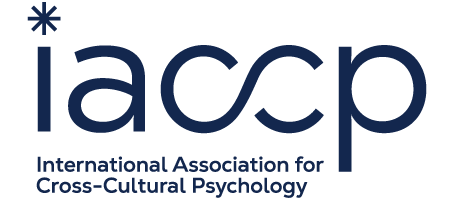The first joint meeting of the International Academy of Intercultural Relations (IAIR) and the International Association for Cross-Cultural Psychology (IACCP) invites the submission of abstracts for its 2025 conference, held from 28 June to 1 July 2025, hosted at the University of Queensland in Brisbane, Australia.
The conference seeks to address many diverse topics under the theme of “Bridging Intercultural Divides in a Digitally Connected World”. This theme highlights the importance of researchers and practitioners coming together across disciplines, traditions, and geographic regions to address issues of cultural diversity and intercultural relations in an increasing digitally connected, but also an increasingly divided world. A key objective of both IAIR and IACCP to build trust and connection among diverse peoples, and this theme highlights how such relationships (and the broader research areas) are challenged, but also enabled by changes in the global sociocultural and technological context.
We accept multidisciplinary submissions (e.g., psychology, education, business, health science, communication, social science, etc.) of research that falls into the broad conference topics.

Submissions Now Closed
All submissions that were recieved before the due date are now under review. You may edit your submission by clicking HERE, logging in and making the relevant changes. Once your abstract has been reviewed the committee will be in touch.
Submissions closed on the 10th of Jan 11:59pm (Brisbane time GMT +10)
Submission Types
Three types of submissions are:
- Symposia
- Individual oral presentations
- Poster presentations
Participants may submit a maximum of two abstracts for any type of submission where they intend on being the presenter. There are no maximum number of submissions on which a participant may be a co-author. Note that due to constraints of space within the program, where participants are selected for more than one presentation their first submission will be prioritised for inclusion.
Presenting Guidelines
Symposia
Guidelines for Symposia
A symposium is a focused session in which individual speakers present their research on a common issue related to the theme and topics of the conference. Symposia should provide a range of perspectives or methods and integrate the distinct contributions into a meaningful whole. The symposium abstract is required to outline the purpose and impact of the overall session. Individual abstracts of each talk should include the background, methods, results and conclusions for each topic.
Format
The recommended format is an introduction of the symposium by the chair (normally the symposium organiser), followed by a minimum of three and a maximum of four individual presentations, a discussant and Q&A. A discussant is optional and is best when there are three rather than four individual talks. Discussants read and comment on the individual talks to present critical takeaways, points of contention, and / or future directions.
The amount of time scheduled will be confirmed closer to the time of the conference and the timing can be scheduled according to the organisers’ discretion (e.g., 5 min introduction, 10 min presentations, 10 min discussant, etc.). Other formats (such as panel presentations or roundtable) will be considered, but proposals for such should include a clear rationale.
Symposia sessions benefit from a diversity of perspectives, institutional affiliations, and geographical regions. Proposals from or including early career investigators are encouraged.
What to include
- The details (name, title, affiliation, email) of the chair of the symposium.
- Symposium title maximum of 15 words.
- Symposium abstract with a maximum of 500 words.
- Three to four individual talks with details of authors (name, titles, affiliation), presenting author, and abstract with a maximum of 300 words.
- Optional: The details (name, title, affiliation) of the discussant of the symposium.
- Up to five keywords highlighting the main topic of the symposium
Additional Information
- It is the responsibility of the chair to ensure that all speakers register for in-person attendance at the conference. If presenters do not register the symposium will not be included in the program.
- Submitting a symposium proposal and/or speaking in a symposium does not prevent authors from submitting an abstract for an individual presentation or poster. However, authors may present a maximum of two presentations at the conference. Also, due to constraints of space within the program initial submissions will be prioritised for inclusion.
- All proposals will be evaluated by the Scientific Committee using a variety of criteria including scientific merit, fit for the conference, novelty, methodological rigour, and diversity of the speakers. Evaluations will not be shared with authors.
- Individual authors may who submit an abstract of part of a symposium that is not accepted may be invited to their abstract as an oral or poster presentation.
Individual Presentations
Individual Presentation Guidelines
Individual presentations are appropriate for stand alone research talks that provide an overview of new research findings, applications of research, or theoretical contributions. This format is ideal for presenting completed and ongoing research, important new methods and areas of investigation, applications of research across cultures or contexts, and discussions of innovations in the field.
For individual presentations at the conference, each presenter will have 15 minutes to deliver their talk and 5 minutes Q&A.
Presentations will be grouped into sessions of around 4 talks based on the topics that are selected by the author(s) at submission to ensure a cohesive and engaging experience for attendees.
An expert committee will review all submissions, evaluating the fit of the research within the overall program, as well as the quality and novelty of the work. Presenters are encouraged to focus on clear, concise communication of their key findings and to highlight the unique contributions of their research.
Posters
Poster Guidelines
Poster Presentations offer a visual and interactive format for presenting research, making them an excellent choice for sharing work in progress, preliminary findings, or complex data that benefits from visual representation. Including elements like QR codes linking to supplementary materials, videos, or interactive data visualisations can significantly enhance the viewer’s experience.
Accepted posters will be displayed on poster boards accommodating A0 sized posters in portrait orientation. Poster presentations will be secured to display boards during dedicated poster sessions, with designated viewing times to encourage open discussion and Q&A with presenters. This format fosters a dynamic and engaging environment for both presenters and attendees.
Presenters are responsible for printing their poster, bringing this to the venue, and setting it up (mounting) at the venue. The organisers will not be able to assist with these services, but will provide the poster boards and means of securing posters. Poster presenters must register for the conference and participate in person and should remain next to their poster while it is on display in order to be available to answer questions from attendees and hold informal discussions.
All poster submissions will be evaluated by the program committee, which will assess the fit of the research within the overall program, as well as the quality and novelty of the work. Additionally, those who submit symposia and paper presentations may be invited to present their work as posters instead.



